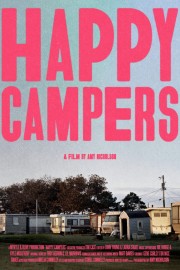Happy Campers
**Seen for the 2024 Atlanta Film Festival.
“Happy Campers” is both a delightful look at a formed community, and a heartbreaking look at the destructive forces of capitalism on the working class. For much of the film’s 77 minutes, Amy Nicholson’s film looks at the lives of people from across the United States whom have found a refuge away from their regular lives, and how they pass the days before it is taken away from them in the name of “progress” and “development.” It’s a painful ending to an otherwise lovely way of living, even if it isn’t an extravagant.
In Chincoteague, Virginia, everyday Americans would come to a seaside trailer park every summer, and simply enjoy one another’s company, and a vacation away from life. As you get a glimpse of this, it’s not hard to think that, for a lot of us, this wouldn’t be our ideal vacation home, but as we see how everyone interacts with one another, and comes together to help one another, the exterior aesthetics don’t matter to these individuals, and they shouldn’t matter to us- this is about a found community where, every year, they come to the same place, and catch up with what the past year has brought to them. This is the definition of found family, and as the film progresses, we see the ways in which these people matter to each other; their successes and failures, their additions and losses to their families, impact everyone else. It’s a look at community that feels fleeting now; even in the age of social media, where we can connect with more people than ever before, it feels very surface, at times, when compared to what these people share. I have memories of it from when we were in Ohio, but it’s hard to keep that up now. As we move from characters to characters I find myself thinking about Errol Morris’s great film, “Vernon, Florida,” and its unusual cast of characters. They are able to be resolutely themselves in a place untouched by capitalism. Sometimes, progress is a good thing; other times, it means a piece of a life is disappearing forever.
The sadness of these people having their personal vacation spot, someplace where they’ve made memories, friendships, and alternate lives for one another, is indeed a tragedy. It’s a tragedy not only because these individuals are losing a place that will not mean 1/10th of what it means to them to the people coming in, but they are losing those connections. Even if they did try to find a new place to go together, there’s something about that specific place that will be missing. That will just leave the memories. With “Happy Campers,” Nicholson makes it clear that, in the end, that is all that will matter in the end. That doesn’t make the fate of this chapter of these people’s lives any less mournful.










